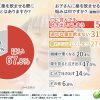BioPhenoMA、研究用PD-L1超高感度測定試薬の受注を開始
株式会社BioPhenoMA(東京都新宿区、CEO:藤井直人、以下BioPhenoMA)は、超高感度ELISAキット(製品名:「PD-L1
TN-cyclon(TM) ELISA KIT」)を11月下旬から発売いたします。10月9日より開催されるBioJapanにて先行受付を開始します。
■研究用PD-L1超高感度測定試薬の概要
PD-L1は、その受容体であるPD-1と結合することによりT細胞の活性を抑制もしくは停止させる免疫抑制機能を有するタンパク質分子です。通常、PD-L1は抗原提示細胞の表面上に発現していますが、腫瘍細胞や腫瘍微小環境に存在する非形質転換細胞の細胞表面上においても発現することが知られています。免疫チェックポイント阻害剤によるPD-1との結合の遮断は腫瘍細胞の増殖を阻害することも明らかにされており、免疫療法の結果を判断するバイオマーカーとしても注目されています。
PD-1やCTLA-4もPD-L1と同じく免疫チェックポイント分子として知られていますが、こちらはT細胞に存在します。一方、PD-L1はがん細胞または抗体提示細胞に存在するので、PD-L1の微量変化を測定することにより、がん細胞そのものの増加(がん化)を正確に追いかけられる可能性を秘めています。
PD-L1は血清中(可溶性PD-L1)、ならびにエクソソームにも存在しています。がんにおけるエクソソームは水平伝播として利用され、それが「がん転移」の機構の重要な一端を担っています。また、健常者の血清中にも僅かながらPD-L1は存在しますので、健常者からがん患者に変わるときにPD-L1がどのように量的変化するかの理解も重要となります。これらの解明により、免疫チェックポイントの重要性が再認識され、その阻害剤の奏効率の向上にも一役買うこととなります。
しかしながら、そもそもエクソソームは量が少なく、健常者では血清中のPD-L1も少ないため、健常者から早期がん患者への移行判別においてはPD-L1の極微量測定が必要となります。質量分析やデジタルELISAのような高価かつ大型装置で何とか検出が可能ではありますが、研究者の皆さま全てが気軽に使うことは難しい現状にあります。BioPhenoMAのTN-cyclon(TM)はラボの一般的な設備で高感度測定が可能な画期的な技術です。
この度、PD-L1研究のブレイクスルーに貢献すべく、血清およびエクソソームの分析も可能な研究用超高感度測定試薬を開発しました。弊社において、リコンビナントPD-L1を緩衝液中で測定した際に0.1
pg/mLの検出限界を達成しております。これは、一般的なELISA法における高感度項目でも検出限界が1
pg/mL以上であることが多いのに対して、弊社のTN-cyclon(TM)はそれよりも10倍高い感度で測定できることを示しています。
またエクソソーム測定においても、PD-L1高発現細胞由来エクソソームおよび管理血清に含まれるエクソソームのPD-L1の定量検出を可能としております。研究用試薬は、11月下旬より販売開始予定で、10月9日-11日に開催されるBioJapan(
https://jcd-expo.jp/ja/)にて先行受付を行います。
BioPhenoMAは、PD-L1測定試薬を皮切りにがん、脳神経、感染症領域などで、早期発見、コンパニオン診断、モニタリング用途で注目されている項目について、測定試薬の開発を進め、ラインアップの拡充を行って参ります。
株式会社BioPhenoMA
https://www.biophenoma.com/早稲田大学
伊藤悦朗教授らが開発した、極微量タンパク質の検出・定量が可能な基幹技術「TN-cyclon(TM)」を有するスタートアップです。
「TN-cyclon(TM)」は、極微量タンパク質の検出・定量に一般的に必要とされる大型で高額な専用装置が不要で、一般的なバイオラボにある設備と本試薬のみで超高感度化を達成することができます。さらに、現在注目を集めているエクソソームの分析にも利用可能です。エクソソーム測定に関しては分離、分画のノウハウも有しております。
弊社は生体現象機構を解析するために極微量タンパク質の検出・定量が重要と考え、“誰もがどこでも簡単に「極微量タンパク質検出」を行える革新的なプラットフォームを創生し、生物医学分野の更なる進歩に貢献する”をミッションとして掲げて、研究開発を推進しています。

研究用PD-L1超高感度測定試薬の外観(製品名:「PD-L1 TN-cyclon(TM) ELASA KIT」)BioPhenoMA Begins Taking
Orders for Ultra-Sensitive PD-L1 Detection Reagent for ResearchBioPhenoMA is
launching Ultra-Sensitive PD-L1 Detection Reagent for Research (Product Name:
“PD-L1 TN-cyclon(TM) ELISA KIT") starting late November.BioPhenoMA Inc. (CEO:
Naoto Fujii, Tokyo Japan, hereafter referred to as BioPhenoMA) has announced the
release of their ultra-sensitive ELISA kit (Product Name: “PD-L1 TN-cyclon(TM)
ELISA KIT") in late November. Pre-orders will be available starting at BioJapan,
which is held from October 9 to 11.Overview of the Ultra-Sensitive PD-L1
Detection Reagent for ResearchPD-L1 is a protein molecule that has
immunosuppressive functions by binding to its receptor, PD-1, which either
suppresses or halts T-cell activity. While PD-L1 is normally expressed on the
surface of antigen-presenting cells, it is also known to be expressed on the
surface of tumor cells and non-transformed cells within the tumor
microenvironment. Blocking the interaction between PD-1 and PD-L1 with immune
checkpoint inhibitors has been shown to inhibit the growth of tumor cells,
making PD-L1 an important biomarker for evaluating the effectiveness of
immunotherapy.PD-1 and CTLA-4, similar to PD-L1, are also known as immune
checkpoint molecules, though they are found on T cells. In contrast, PD-L1
exists on cancer cells or antigen-presenting cells, so measuring even slight
changes in PD-L1 can potentially allow researchers to accurately track the
proliferation (cancerization) of cancer cells. PD-L1 is also found in serum (as
soluble PD-L1) and exosomes. Exosomes, particularly in cancer, play a crucial
role in mechanisms such as horizontal transmission, which is linked to cancer
metastasis. Furthermore, a small amount of PD-L1 is present in the serum of
healthy individuals, making it important to understand how the quantity changes
when transitioning from a healthy state to cancer. This knowledge can contribute
to the re-evaluation of the significance of immune checkpoints and improve the
effectiveness of inhibitors.However, since exosomes are limited in quantity and
PD-L1 levels in the serum of healthy individuals are also low, it is essential
to measure ultra-small amounts of PD-L1 when distinguishing between healthy
individuals and early cancer patients. While detection is possible using
expensive, large-scale instruments like mass spectrometry or digital ELISA,
these methods are not easily accessible to all researchers. Our TN-cyclon(TM)
technology enables high-sensitivity measurements using standard laboratory
equipment, making it a groundbreaking innovation.In an effort to contribute to
breakthroughs in PD-L1 research, BioPhenoMA has developed an ultra-sensitive
detection reagent for research that can analyze both serum and exosomes. In
tests conducted by the company, the limit of detection (LOD) for recombinant
PD-L1 in buffer solution was achieved at 0.1 pg/mL. This is 10 times more
sensitive than standard ELISA methods, which typically have LOD of 1 pg/mL or
higher. Furthermore, the reagent enables the quantification of PD-L1 in exosomes
derived from PD-L1 high-expressing cells and control serum exosomes. The product
is scheduled to go on sale in late November, with pre-orders available during
BioJapan (October 9-11) (
Starting with PD-L1 detection reagents, BioPhenoMA plans to expand its lineup of
detection reagents for applications in cancer, neuroscience, and infectious
diseases. These reagents will be used for early diagnosis, companion
diagnostics, and monitoring purposes.BioPhenoMA Inc.https://www.biophenoma.com/
https://www.biophenoma.com/A startup that holds the core technology
“TN-cyclon(TM)," developed by Professor Etsuro Ito at Waseda University, which
enables the detection and quantification of ultra-trace proteins.
“TN-cyclon(TM)" allows for ultra-sensitive protein detection without the need
for large, expensive dedicated equipment, achieving high sensitivity with just
standard bio-lab equipment and this reagent. Moreover, it can be used for
exosome analysis, a field of growing interest. The company also possesses
know-how in exosome isolation and fractionation.Our mission is to create an
innovative platform that allows anyone, anywhere, to easily detect ultra-trace
proteins, thus contributing to further advancements in biomedical research.
当リリースの詳細について
https://prtimes.jp/main/html/rd/p/000000007.000132552.html
※このメールは自動送信されていますので、返信はご遠慮ください。






ディスカッション
コメント一覧
まだ、コメントがありません